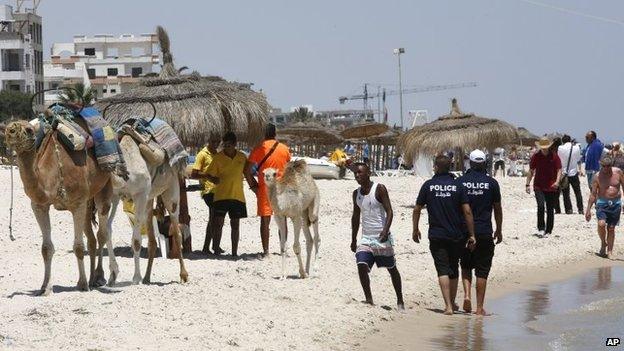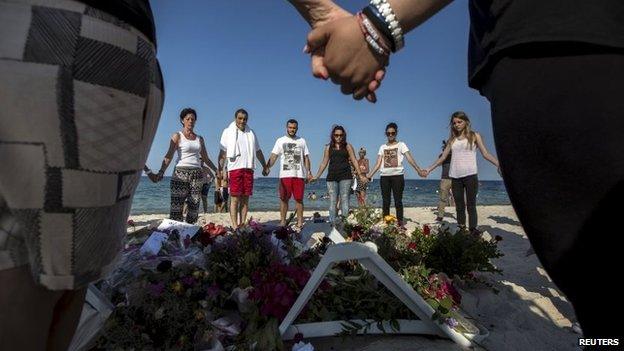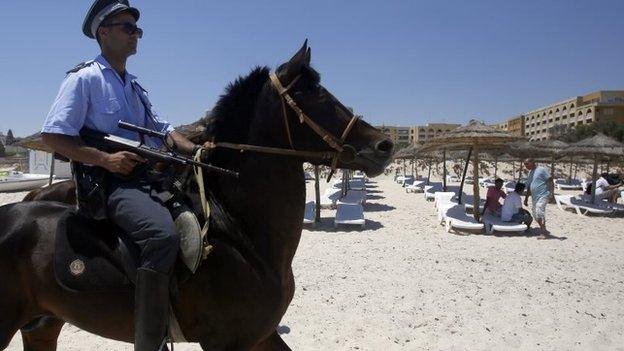Tunisia attack: What can UK police do?
- Published

The Metropolitan Police has launched a massive operation
The investigation into the Tunisia beach attack has become one of the largest counter-terrorism operations the UK has seen in a decade.
Just a week away from the tenth anniversary of the 7 July London suicide attacks, the Metropolitan Police has launched an enormous operation to establish what happened, support families and help the Tunisians pursue every possible lead.
But given that the gunman is dead, what in practical terms will the British police and security officials be doing?
UK arrivals
More than 600 officers and staff have been assigned to the operation because of the scale of the attack and its international nature.
In the UK, some 380 officers and staff have been meeting British tourists at airports to gather evidence. On Saturday alone, the police met passengers returning on 27 flights.

Police will want to build up a picture of the scene when the gunman opened fire
Detectives will want copies of any pictures or video from their cameras and phones that will not just record the attack but, potentially, other scenes that may help establish the lead-up to Seifeddine Rezgui opening fire.
Detectives want to build as complete a picture as possible of what happened and they are appealing to anyone who was in Sousse around the time of the attack to get in touch.
Many of the returning holiday-makers will be asked to give witness statements. Aside from the basic gathering of evidence, some 60 family liaison officers are in contact with relatives across the UK to explain to them how the investigation is proceeding and, where necessary, to help them get professional support such as counselling.
Team in Tunisia
Within hours of the attack, Scotland Yard had sent 16 officers to Tunisia, including senior counter-terrorism detectives and specialist forensics and family liaison officers. That team is being expanded and the first priority remains completing the identification of the dead.
In any disaster, this can be a very difficult and harrowing task as families wait for news on their loved ones. If the Tunisian authorities have an unidentified victim who could be from the UK, they may need to call on the British team to track down dental records or DNA from relatives to help firmly establish who they are.
Manhunt
Tunisia's Interior Ministry spokesman Mohammed Ali Aroui has said the authorities are "sure" that Rezgui had accomplices.
The Tunisian authorities believe that the suspected accomplices will have provided the weapon and helped him to get to the scene.
In the UK, a manhunt of this nature would involve:
CCTV images of the scene
Records of payments by bank cards
Tracking the movement of a suspect's mobile phone
Tracking the movement of suspect vehicles
The British police will want to know more about the local intelligence picture: What was previously known about the gunman? How much do Tunisia's agencies know about his network? Where and how was Rezgui prepared for his attack? Will this intelligence help prevent other potential attacks inside the country or, possibly, overseas.
Learning lessons

Authorities in Tunisia will need to review security
Beyond the immediate investigatory priorities, a critical issue for the Tunisian authorities after two major attacks in months will be reviewing the security profile of their resorts - and six British officials are now helping them.
Some holiday-makers have said that security guards look like they are spread too thinly and police tend to be clumped together at key locations.
Home Secretary Theresa May flew to Tunisia on Monday to offer her department's vast expertise and support to its government. In the wake of the 7/7 London attacks a decade ago, British counter-terrorism planners began analysing and preparing for every scenario they could think of to minimise the risk of another catastrophic loss of life.
Parts of London's streets and main public areas have been deliberately, but often very subtly, redesigned to prevent car bomb attacks. Armed police are organised and managed to ensure that a wide security net is thrown over the city to reduce to the minimum the time needed to reach a critical incident and to reduce the chances of a marauding gun attacker going unchallenged for long.
Many countries have a similar approach. Jordan, for instance, has a constant and substantial police presence around its popular tourism attractions with officers stationed at specific points to ensure visitors are reassured and officers have as much ground as possible under guard.
The British government publishes advice on how to protect crowded spaces, external and it regularly commissions scientific research and live simulations to help emergency services hone their skills.
But the work will start with understanding exactly what happened in Sousse in the hope that both countries can learn lessons that will help cities around the world better prepare for the worst.